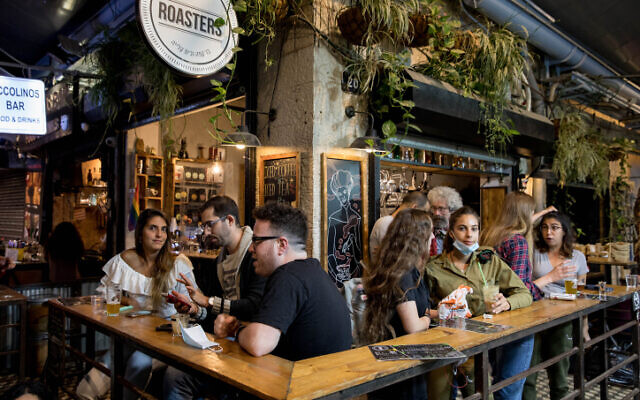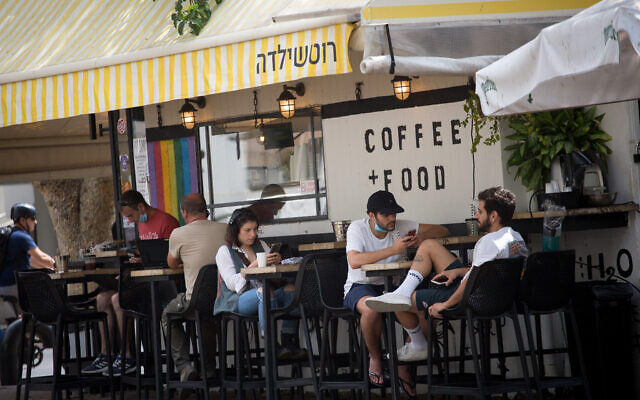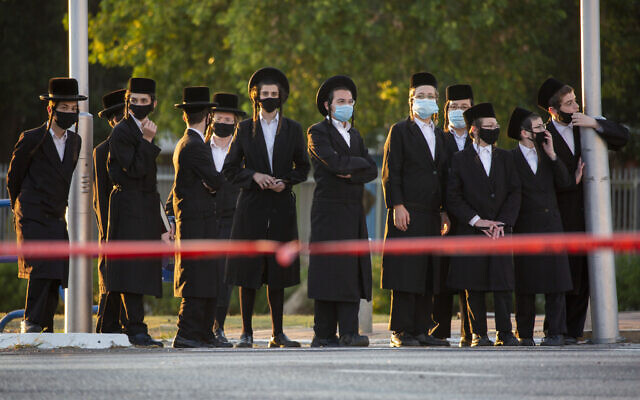New rules go into effect Monday morning; cabinet slated to discuss re-imposing additional limits on restaurants, beaches and cultural events

The Knesset’s coronavirus committee voted on Sunday to approve government regulations limiting gatherings in bars, event halls and synagogues to 50 people.
The new restrictions will go into effect at 8 a.m. Monday, after seven out of 10 lawmakers on the special panel backed the restrictions. The regulations will not apply to restaurants, offices, malls or other retail centers.
It was not immediately clear if the regulations apply to outdoor spaces as well as indoors. Announcing the restrictions last week, Prime Minister Benjamin Netanyahu had specified that they would apply to indoor spaces.
Israel has seen cases of COVID-19 reach new levels in recent days, leading the government to reconsider its May rollback of virus restrictions, which saw almost all limits on gatherings rescinded. Event halls and clubs were only given the okay to reopen in mid-June, and officials have pointed to them as a major driver of new infections.
On Monday, the cabinet is slated to discuss re-imposing additional restrictions on restaurants, beaches and cultural events, which will also be sent to the Knesset’s coronavirus committee for final approval, Hebrew media reported.
For the past month, gatherings at event halls were okayed for up 250 people, while restaurants have been allowed to host up to 100 people or 85% of their capacity, whichever is larger. Establishments were tasked with maintaining social distancing and hygiene rules, but enforcement of the measures was lax.
Sunday’s vote came two days after a cabinet decision limited other gatherings in closed spaces, such as private homes, to 20 people.

Opposition leader Yair Lapid lambasted the government for imposing a blanket 50-person limit for all event hall and bars, saying the size of each venue should have been taken into account.
“There is no logic in the directive to limit it to 50 people in every place. The order should have been taken with [consideration for] the size of the venue, but no one in this lazy government is working,” he tweeted.
Critics say the decision will effectively re-shutter clubs and event halls, which cannot operate without enough patrons. Industry figures had predicted some 150,000 workers could be placed back on unpaid leave because of the new regulations.
Israel has seen the number of new confirmed coronavirus cases surge to around 1,000 a day, but has been reluctant to reimpose blanket lockdowns or shut down retail spaces and childcare services, fearing further damage to the already battered economy.
Instead, the government has pushed for increased enforcement of mask-wearing and other social distancing regulations, and has sought to bolster contact tracing efforts via the use of phone tracking technology.
Energy Minister Yuval Steinitz said Sunday he was pushing the government to develop a civilian tracking application to replace Shin Bet surveillance. Israelis will be required to download the app to their phones to have access to public spaces, he said.
“We’re in a war!” he tweeted, referring to the rising virus cases.

Earlier Sunday, Deputy Health Minister Yoav Kisch warned that the second wave of coronavirus infections was worse than the first outbreak and that mass gatherings must be stopped to slow the rate of infection and perhaps prevent a future full lockdown.
“We’re facing a long war of attrition,” he told a Knesset panel dedicated to the pandemic response. “We are in the second wave [of the pandemic] and it’s worse than the first — we must bring back restrictions.”
“We’ve doubled the number of sick in 10 days. There is a larger number of new serious cases. The infections are spreading all over the country,” Kisch said.

Kisch’s statement came hours before the Health Ministry announced Sunday evening that there were 86 people in serious condition and 68 moderately ill as a result of the coronavirus, and a day after a team of experts warned that Israel’s hospital system was in danger of collapse at current infection rates.
During Sunday’s cabinet meeting, Prime Minister Benjamin Netanyahu said, “If we do not block the spread of the coronavirus we will have neither health nor an economy. Many citizens in the State of Israel will lose their lives.”
He said that Israel has entered an “emergency situation,” adding that “we cannot approach Knesset legislation, with the steps that we are taking, as if everything was normal. It is not.”
The Health Ministry announced Sunday evening that there have now been 29,787 confirmed coronavirus cases in Israel since the start of the pandemic, with 757 coming in the last 24 hours. The number of active cases rose to 11,540.
The death toll rose by one to 331.
The Health Ministry reported that it had conducted 16,749 tests on Saturday and 12,172 as of Sunday evening.
As reported by The Times of Israel
